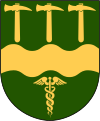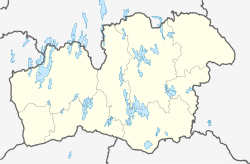Ljungby
| Ljungby | ||
|---|---|---|

Storgatan with Ljungby Church in the background.
|
||
|
||
| Coordinates: 56°50′N 13°56′E / 56.833°N 13.933°ECoordinates: 56°50′N 13°56′E / 56.833°N 13.933°E | ||
| Country | Sweden | |
| Province | Småland | |
| County | Kronoberg County | |
| Municipality | Ljungby Municipality | |
| Area | ||
| • Total | 11.93 km2 (4.61 sq mi) | |
| Population (31 December 2010) | ||
| • Total | 15,205 | |
| • Density | 1,274/km2 (3,300/sq mi) | |
| Time zone | CET (UTC+1) | |
| • Summer (DST) | CEST (UTC+2) | |
Ljungby (Swedish pronunciation: [jʉːŋ.byː]) is the central locality of Ljungby Municipality, Kronoberg County, Sweden, with 15,785 inhabitants in 2015.
Ljungby was in 1829 instituted as a köping, or market town, and did not become a municipality of its own when the first local government acts took effect in 1863, but retained part of the surrounding rural municipality of the same name. In 1936 Ljungby got the title city. It is since 1971 the seat of Ljungby Municipality.
Much of the town centre was destroyed in a fire in 1953. The (at the time) modern style of the rebuilding characterized by e.g. Hotel Terazza remains controversial locally.
The first known inhabitant of the area that is today's Ljungby was Astrad, as can be read on the runestone Replösastenen from the 11th century located a couple of kilometers from the city centre. The runestone says: "Götrad made this stone after Astrad, the foremost of kinsmen and yeomen (odalmän) who in Finnveden formerly lived". In 1952 a statue by John Lundqvist was erected near the main plaza depicting Astrad and Götrad. But there were other people living around Ljungby long before Astrad and Götrad as evident by the numerous burial mounds in the area. One of the largest burial mounds lies close to the water tower and is named Kungshögen. The largest burial is however Höga rör that lies some kilometers south of Ljungby on the slope of the Lagan river valley.
In the 12th century the first stone church was built with the formation of the parish Ljungby socken. Ljungby had for a long time been the crossroad where the two important north-south and east-west trade routes met. Because of this a hostelry was built adjacent to the Laganstigen in the 14th century by royal decree.
In 1828 Ljungby only consisted by five farms. It was in the beginning of the 19th century the need for a city in Sunnerbo hundred was raised. Ljungby competed with the village Berga, where bishop Henrik had obtained permission to found a city. As Ljungby was considered to be located more central in the hundred and had better road connections, the choice fell on the latter option.
...
Wikipedia



